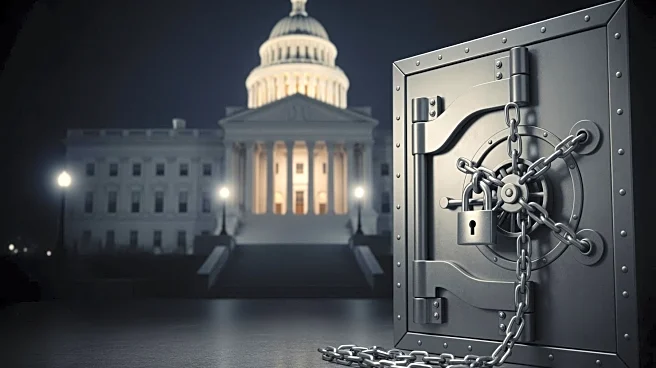What's Happening?
Senate Democrats have blocked a $852 billion defense spending bill intended to fund the Department of Defense through September. The decision comes as the government shutdown enters its third week, with
Democrats rejecting Republican efforts to pass individual full-year spending bills. The bill fell 10 votes short of advancing, with only three Democrats siding with Republicans. The House has passed its own version of the bill, but differences between the two versions mean the military would remain unfunded even if the Senate bill were to pass. Democrats are pushing for negotiations on extending health care subsidies as part of reopening the government, while Republicans criticize the Democrats for holding up defense funding.
Why It's Important?
The blocking of the defense spending bill highlights the ongoing political stalemate in Washington, which has significant implications for national security and military operations. The inability to pass the bill means that funding for the military remains uncertain, potentially affecting military readiness and operations. The shutdown also impacts federal workers, with furloughs and redirected funds causing disruptions. The situation underscores the broader political divide over budget priorities, with Democrats seeking to leverage negotiations for health care subsidies and Republicans emphasizing defense funding. The impasse could have long-term effects on government operations and public trust in political leadership.
What's Next?
The Senate may vote next week to work with the House on a full-year spending bill that has already passed both chambers, which would fund military construction and veterans affairs. However, the broader shutdown negotiations remain unresolved, with Democrats and Republicans needing to find common ground on budget priorities. The Trump administration's decision to use Pentagon funds to pay active-duty troops without congressional approval may face legal challenges, adding another layer of complexity to the situation. Political leaders will need to navigate these issues to prevent further disruptions and address the underlying budgetary disagreements.
Beyond the Headlines
The shutdown and defense spending impasse reflect deeper issues in U.S. political processes, including the challenges of bipartisan cooperation and the influence of executive actions on legislative powers. The situation raises questions about the balance of power between Congress and the presidency, particularly in budgetary matters. Additionally, the focus on defense spending versus social programs highlights ongoing debates about national priorities and resource allocation. These dynamics could influence future legislative strategies and political campaigns, as parties seek to address voter concerns and policy goals.









